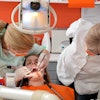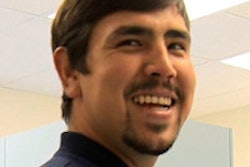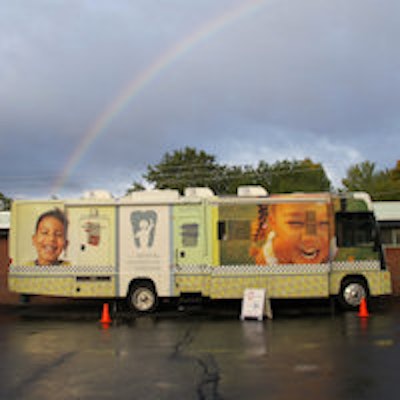
Dentist Bruce Richardson, DMD, of Portland, OR, recently gave a 5-year-old boy a great Christmas gift that even Santa can't match.
"I gave him his smile back for the holidays," said Dr. Richardson, explaining how he had restored and bonded the little boy's front teeth, which were badly decayed from "baby bottle syndrome."
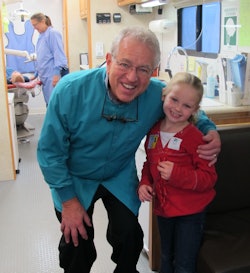 Dr. Bruce Richardson with one of his young patients. All images courtesy of Dental Foundation of Oregon.
Dr. Bruce Richardson with one of his young patients. All images courtesy of Dental Foundation of Oregon.
"That was kind of fun, and he was really appreciative," Dr. Richardson told DrBicuspid.com.
The little boy was one of several Dr. Richardson has treated on his travels with the Tooth Taxi mobile dental van, which provides much-needed care to schoolchildren in low-income areas of Oregon.
"Most of the children have a lot of problems, lots of decay and abscesses," Dr. Richardson said. He estimated that a third of the children he treated at a recent visit to Veneta Elementary School in a small town west of Eugene were in pain from dental problems.
"Some of the children have never seen a dentist, some don't brush at all, but some are fairly OK," Dr. Richardson said of the children he's seen. He treats about seven to eight children a day doing restorations, pulpotomies, extractions, and stainless steel crowns. Children who need complicated procedures such as orthodontics are referred to volunteer dentists for follow-up work.
The children also get cleanings, x-rays, fluoride varnish treatments, and sealants for their teeth. Each child also gets a kit with toothbrush, floss, a timer for brushing, a mirror, and toothpaste. In addition, volunteer staffers provide classroom instruction about oral hygiene and brushing techniques.
The brightly colored Tooth Taxi is a 38-ft motor home that has been customized into a high-tech dental office with two fully equipped operatories that include digital radiography. The traveling clinic is sponsored by the Dental Foundation of Oregon (the charitable arm of the Oregon Dental Association), the OEA Choice Trust, and Moda Health.
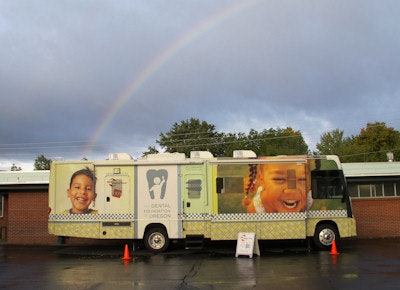 Since the Tooth Taxi mobile dental van launched in 2008, it has visited about 236 schools and community programs throughout Oregon.
Since the Tooth Taxi mobile dental van launched in 2008, it has visited about 236 schools and community programs throughout Oregon.Since the mobile dental van's launch in 2008, it has visited about 236 schools and community programs throughout the state. More than 14,000 students have received about $3.9 million worth of free oral care from some 600 volunteer dentists, hygienists, and dental assistants, according to Charlie LaTourette, the executive director at the Dental Foundation of Oregon.
In addition to schoolchildren, the Tooth Taxi has also treated young adult agricultural workers.
Program manager Mary Daly said they try to make it a positive experience for the children, letting them watch cartoons and movies while they're in the chair, and giving them prizes and stickers when they're done.
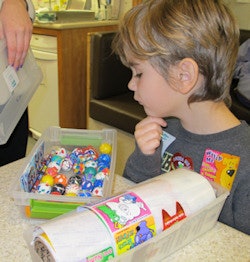 Decisions, decisions, decisions. A young boy gets to pick out a prize.
Decisions, decisions, decisions. A young boy gets to pick out a prize.
Some of the children share toothbrushes because they don't have their own, she said. "It's amazing that some kids don't have what we take for granted," she told DrBicuspid.com.
"We had one student who was in so much pain that he tried to pull his own tooth with pliers," Daly recalled. "We see a tremendous amount of decay."
She recalled seeing a 15-year-old girl whose front teeth were completely black from caries. "Her dad lost all his teeth before he was 30. You can see it's cyclical in some families. We do whatever we can to save teeth," she said.
Another student was in such pain that the vice principal drove him to where the Tooth Taxi is usually parked so he could get the tooth extracted. "There are a lot of educators who understand how much dental pain affects kids' nutrition and their learning ability. They're super supportive of the program because they see kids in pain or who are absent because of toothaches," Daly said.
"Once word gets out that it's fun, the kids post about it on social media, and they get excited about coming in," Daly said. "The kids say, 'It's my turn,' and give you a hug. Some of them don't get a lot of attention, and they thank the providers when they're done."
Dr. Richardson, who is retired from full-time dentistry, tries to avoid the "n word" (needle) and other terms that might scare the kids. "I tell them I'm going to use sleepy water to find sugar bugs hiding in tooth caves," he explained.
Staffers tell the children that tooth decay is a preventable disease. "We tell them once you get your adult teeth, that's kind of your last chance," Daly explained.
“To be able to get kids out of pain is really special.”
One mother cried because she was so grateful for the dental care her child received, Daly said. Others bring cookies as thank you gifts.
The van spends a week at schools during visits, partly because many children need more than one appointment to take care of their needs.
"We become part of the community," Daly said. "We see the kids and their families in the grocery store, or their parents work at the hotel where we stay."
Oregon's children have some of the highest rates of caries in the U.S., LaTourette said. "There are children who can't eat and sleep because of the amount of dental infections," he said. "Sometimes it's a life-threatening situation, and it's a huge cost to the healthcare system when they don't get basic preventive care."
The work is incredibly rewarding for those who provide care to children with such great needs. "To be able to get kids out of pain is really special," Dr. Richardson said.

